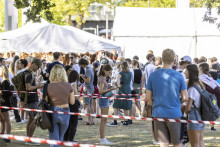The intake figures are described in the latest management report. These show that the number of first-years that started last September fell well short of the UT's budget and ambitions. Whereas some 3,000 first-year bachelors were expected, only 2,200 enrolled.
The number of master's students also below expectations. Since master students also enroll in February, those figures are still unclear. Nevertheless, in total there are expected to be 10 per cent fewer master's students than planned in this academic year. The lower intake will cause a financial setback of approximately 2.2 million euros for the UT in 2022.
Explanations
According to Machteld Roos, vice-president of the Executive Board, there are several explanations for the intake dip. ‘The figures have declined sharply with respect to last year, but that was precisely when there was a sudden spike – which was also accompanied by unwanted consequences. This year, we see a clear effect of two programmes that have introduced a numerus clausus (psychology and technical computer science, ed.). External factors also play a role: As of September 2023, the basic study grant will be reintroduced, which may explain the lower intake of Dutch students this academic year. Furthermore, the admission requirements for Indian students have been tightened and there is a new legislation in Germany that makes studying in the Netherlands less advantageous for German students than previously. We are noticing the consequences of that.’
Interestingly, the intake at the UT is decreasing, while that of other Dutch universities is rising, albeit slightly. The vice-president attributes this to the corona crisis. 'Our open days are incredibly important moments with regards to study seekers, especially because of our campus as a showpiece. As those days had to take place online last year because of the corona crisis, we as a campus university suffered more than other universities.'
Recovery
Roos expects the intake to at least recover in the coming academic year. 'In view of the reintroduction of the basic grant, the rebound in intake at the programmes that introduced the numerus clauses and the fact that we were able to - succesfully - organise physical open days once again, we expect recovery next academic year.'
And growth is precisely what is desired, says Roos, stressing the recent words of fellow board member Vinod Subramaniam. 'The societal challenges we face - climate, healthcare and security, among others - require sufficient people. We also emphatically see this demand for talent in the region at MBO, HBO and university level. Our message as a university is: we have room for new students at our programmes. There is also expected to be enough housing for students available in the region and there are plans to increase the supply even further.'






